Diabetes is a disease that affects your body’s ability to produce or use insulin. Insulin is a hormone. When your body turns the food you eat into energy (also called sugar or glucose), insulin is released to help transport this energy to the cells. Insulin acts as a “key.” Its chemical message tells the cell to open and receive glucose. If you produce little or no insulin, or are insulin resistant, too much sugar remains in your blood. Blood glucose levels are higher than normal for individuals with diabetes. There are two main types of diabetes: Type 1 and Type 2.
Null Bazaar
3AB-5AB,75 Jariwala Building, SVP Road,
Null Bazaar Mumbai - 400003
Mazgaon
Crystal Residency, B-11, 65 A, Dockyard Rd,
next to Mazgaon Garden, Mazgaon,
Mumbai, Maharashtra - 400010
Agripada
113, Maulana Azad Rd, Municipal Colony, Byculla West,
Agripada, Mumbai, Maharashtra - 400011
Ghodapdeo
Shop no 4, Badawala Building DP wadi, next to Kapreshwar Temple,
Ghodapdeo, Byculla, Mumbai, Maharashtra - 400033

Null Bazaar

Mazgaon

Agripada

